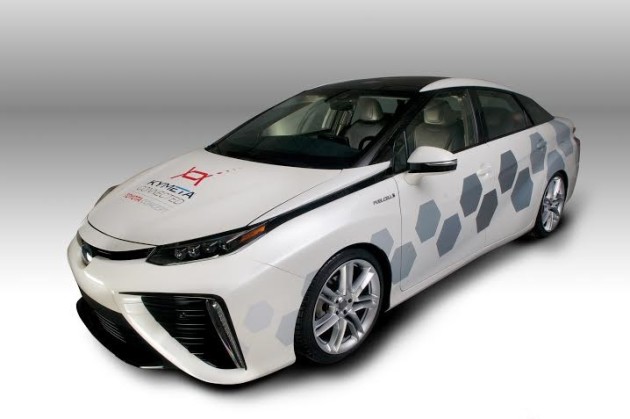
Redmond-based Kymeta Corp. and Toyota took the wraps off their collaboration on a satellite antenna system that can send data to cars at broadband speeds.
Toyota’s antenna-equipped, hydrogen-powered Mirai fuel-cell vehicle was unveiled today at the North American International Auto Show in Detroit. The prototype communication system can download satellite data at 50 megabits per second, which is better than typical LTE wireless service. The transmission speed is expected to rise past the gigabit-per-second mark within a few years.
Kymeta said Mirai Creation Investment Limited Partnership, a Japan-based fund in which Toyota participates, is providing a strategic investment to push the initiative along. The company declined to specify how much is being invested, other than to say that the amount is significant. On Monday, Kymeta said it closed a $62 million investment round that includes money from Mirai.
For now, the satellite antenna system is being installed on Mirai research vehicles, but not on cars being sold to customers. Kymeta President and CEO Nathan Kundtz said that status is likely to change within the next couple of years.
“Toyota wants it as soon as they can possibly have it,” Kundtz told GeekWire last week during an interview at Kymeta’s headquarters. He pointed out that Mirai is the Japanese word for “future.”

Kymeta was spun out from Intellectual Ventures in 2012 with investments from Microsoft founder Bill Gates, Lux Capital, Liberty Global and other venture-capital heavyweights.
The car antennas are 6-inch-wide, six-sided panels that can be installed as modules in a car’s roof. The system requires less than 10 watts of power, Kundtz said. If you need more bandwidth, more modules go into the roof.
Like Kymeta’s bigger antennas, the mTenna car system takes advantage of metamaterials and LCD technology to pick up satellite signals from any direction without the need for pointing.
Kundtz said he didn’t expect the antennas to add to the cost of a car. “Because of the ability to do software updates, the net cost add to a car is actually negative,” he said.

Sending software updates is likely to be the one of the system’s first applications. The early adopters could also include VIPs who need secure satellite links, or shippers or farmers who drive their vehicles through areas that can’t be reached by other types of communication networks.
“Satellite connectivity is the most pure form of connection you can get,” Kundtz said.
He predicts that satellite connections to your car will eventually become the main channel for in-car connectivity, including the delivery of games and movies to “the kids in the back seat.” Kymeta’s current target is the delivery of a terabyte of data per month, or the equivalent of at least 100 HD movies.
“The reality is, that’s the very beginning of what we can do,” Kundtz said.

Kymeta says it has partnered on car antenna development since 2013. As part of the research project, a Toyota 4Runner sport utility vehicle was outfitted with a prototype roof antenna and put through an 8,000-mile road test, Kundtz said.
Kundtz said his company’s objective is to make satellite communications as easy and ubiquitous as wireless is today, thanks to advanced antennas. “Now you’re not playing in a paltry $100 billion satellite communications market,” he said, half-jokingly. “You’re playing in the trillion-dollar wireless market.”
Will Kymeta do it? Three and a half years after its founding, the venture has made a good start. Toyota’s connected-car project intersects with other partnerships that have been forged with Intelsat, Sharp and UIEvolution. It also complements last week’s deal with Panasonic Avionics for maritime satellite antennas.



